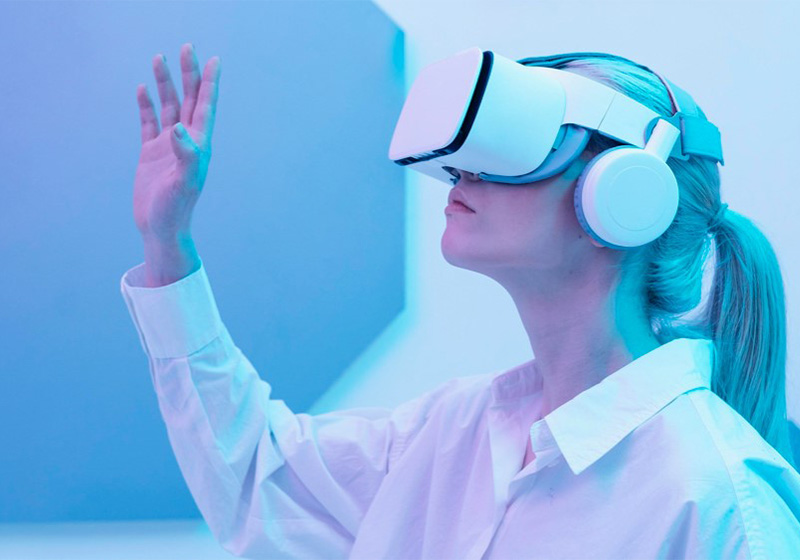Table of Contents
In the article “Metaverse: what it is and the opportunities it offers”, we saw how some businesses had managed to rethink their marketing strategies for the virtual world. Far from being just another digital touchpoint, the metaverse marks an epochal shift from the 2D internet to an interactive and immersive 3D world. The blurring of boundaries between real and virtual spaces creates a new fluid dimension where people can do all sorts of things. Through their avatars, users can attend business meetings, buy products and services, watch concerts, and play and socialise with others.
The purchase experience is transformed into a playful journey on which people can try out and buy products in an immersive and interactive environment inspired by the video game world. In this “phygital” reality, buying a product from a real shop can unlock access to digital goods like NFTs, and virtual live events can drives sales of merchandise in bricks and mortar shops.
In this article, we’re going to look at how some companies have entered the metaverse and what they’ve managed to achieve in terms of brand experience, business process optimisation and customer loyalty.
Is entering the metaverse worth it?
This network of virtual worlds continues to be viewed with scepticism: many of its detractors struggle to grasp the real added value offered and the business applications beyond gaming. Recent research by consulting firm McKinsey shows how this new dimension has the potential to become next version of the Internet. It predicts that, by 2030, the metaverse could generate revenues of up to 5 trillion dollars.
Around 64% of consumers interviewed said that they were excited or very excited about shopping in the metaverse, while 59% said that they preferred doing one or more activities in the 3D world over the physical one. Users’ preferred activities were shopping for digital and physical goods and services (79%), followed by gaming, taking part in events (78%) and fitness (76%). Dating (73%) and doing training courses (72%) were close behind.
This data reveals how the metaverse represents a golden opportunity for businesses. From marketing campaigns to corporate events, from product design to staff training, this immersive world promises to bring real innovation in the way in which brands and people communicate and interact, both inside and outside organisations. Let’s take a look at some examples of brands that have embraced the metaverse and how they’ve used augmented and virtual reality technologies to grow their businesses.

Adidas: digital meets analogue in the collectible world
The metaverse is the perfect place to launch a brand loyalty initiative for die-hard fans by issuing exclusive collections of NFTs (non-fungible tokens), in other words, ownership certificates for digital creations. At the end of 2021, Adidas unveiled a series of NFTs that entitled holders to receive a physical limited-edition hoodie with logos by Bored Ape Yacht Club, Punks Comics and GMoney. In no time, buyers of Adidas NFTs had created a community that provided input for designing products and experiences offered by the brand, for which they were rewarded with the right to buy exclusive merchandise. The strategy pursued by Adidas is a textbook example of how to harness the hybrid digital and virtual opportunities offered by the metaverse to create physical and virtual collectibles and increase brand loyalty.

Immersive Factory, LEF’s virtual laboratory
LEF is the world’s “largest and most integrated digital model factory” with over 180 use cases implemented in its 3000 sqm space. The firm’s experiential training centre designs training solutions to help manufacturing businesses to improve their efficiency and sustainability. In 2022 it launched the Immersive Factory, a laboratory in the metaverse where people connected via live streams can collaborate and improve their skills using virtual, augmented and mixed reality technologies.
By creating virtual and interactive industrial environments, this immersive training experience enables employees to be trained more quickly and effectively, thereby improving workplace safety and enhancing operations. LEF is an example of how manufacturing companies can accelerate innovation and competitiveness by leveraging the potential of the metaverse.

Carrefour: recruitment and product marketing
The metaverse has also drawn in the supermarket sector: in 2022, Carrefour bought virtual space on Sandbox for an experimental recruitment campaign. The French supermarket group created a virtual campus where candidates, represented by an avatar, could interact with the company, and even attend a remote job interview. The group has also partnered with Procter & Gamble to advertise cleaning products from the Mr. Clean range on the LifeLab virtual reality platform.
Inside Mr. Clean’s house, users are invited to test products virtually before buying them on the Carrefour website. They also get voucher worth 40 euro. It’s a playful initiative designed to provide an interactive and engaging shopping experience to members of Gen Z by connecting the metaverse to the world of e-commerce.

Spotify: the music island for artists and their fans
Spotify has created a virtual island on Roblox where users can play, create custom tracks, meet artists from around the world and collect heart-shaped “Like” icons that can be exchanged for free merchandise. On Spotify Island, people can create and record tracks on Soundtrap, the company’s cloud-based music production studio, or collect musically themed pets and complete challenges on the island to win prizes. It is also possible to shop exclusive digital capsule collections inspired by artists’ discographies and access playlists reserved for NFT holders.
The many tools offered by the virtual world have enabled organisations to not only reach new audiences through targeted marketing actions, but also develop innovative solutions for improving organisations internally at every level, from designing products to recruiting and onboarding new employees. But, so far, the high costs of entry have prevented most SMEs from entering the metaverse. It remains to be seen whether this space will also become accessible to smaller companies and how they will use immersive technologies for their business. However, one thing is for sure: more exciting new chapters will open in this fascinating virtual universe.


